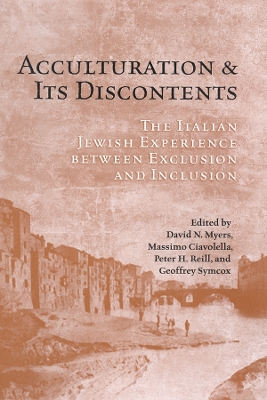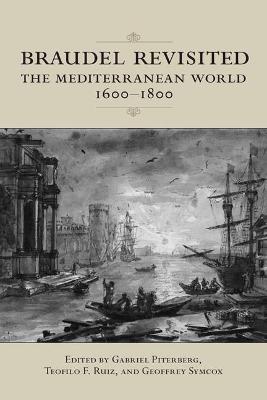UCLA Clark Memorial Library
1 primary work • 2 total works
Book 10
Acculturation and Its Discontents
by David N. Myers, Massimo Ciavolella, Peter H. Reill, and Geoffrey Symcox
Published 1 January 2008
Exploring the fascinating cross-cultural influences between Jews and Christians in Italy from the Renaissance to the twentieth century, Acculturation and Its Discontents assembles essays by leading historians, literary scholars, and musicologists to present a well-rounded history of Italian Jewry. The contributors offer rich portraits of the many vibrant forms of cultural and artistic expression that Italian Jews contributed to, but this volume also pays close attention to the ways in which Italian Jews - both freely and under pressure - creatively adapted to the social, cultural, and legal norms of the surrounding society. Tracing both the triumphs and tragedies of Jewish communities within Italy over a broad span of time, Acculturation and Its Discontents challenges conventional assumptions about assimilation and state intervention and, in the process, charts the complex process of cultural exchange that left such a distinctive imprint not only on Italian Jewry, but also on Italian society itself. This collection of rigorous and thought-provoking essays makes a major contribution to both the history of Italian culture and the cultural influence and significance of European Jews.
Fernand Braudel (1912-1985), was a leading French historian and author of, among other books, the groundbreaking The Mediterranean and the Mediterranean World in the Age of Philip II (1949). One of the founders of the Annales School in France, Braudel insisted on treating the Mediterranean region as a whole, irrespective of religious and national divides. Braudel's new historiography rejected political history as the dominant discipline and espoused a 'total history' or a 'history from below' that would tell the story of the vast majority of humanity hitherto excluded from the grand narrative. At the time of the book's appearance, this premise was revolutionary. The contributors to Braudel Revisited assess the impact of Braudel's work on today's academic world, in light of subsequent methodological shifts. Engaging with Braudel's texts as well as with his ideas, the essays in this volume speak to the enduring legacy of his work on the ongoing exploration of early modern history.

